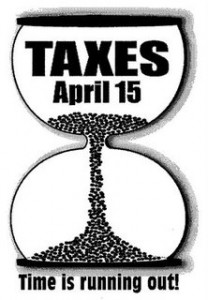Posts Tagged ‘tax preparer’
Posted on: March 14th, 2013 by Amy Bolger
 A tax-preparation software glitch caused more than 600,000 returns to be filed incorrectly, delaying refunds by as much as six weeks, the IRS says. A tax-preparation software glitch caused more than 600,000 returns to be filed incorrectly, delaying refunds by as much as six weeks, the IRS says.
H&R Block, the nation’s largest tax preparer, confirmed that its software failed to fill out a mandatory field on Form 8863, which is used to claim educational credits. The IRS would not say what percentage of the roughly 600,000 faulty returns came from H&R Block, but the company received thousands of complaints on its Facebook page and on Twitter. An Internet search did not yield similar complaints against other tax preparers.
The snafu is affecting about 10% of the 6.6 million tax returns containing Form 8863, IRS spokeswoman Michelle Eldridge says. Those taxpayers may have to wait six more weeks before they receive their refunds, she says, adding that the IRS is hoping to reduce that wait time.
H&R Block confirms there is an issue with tax returns filed before Feb. 22 because the IRS changed the way it processes some of the yes or no questions on the form. While in previous years, leaving a field blank to indicate “No” on certain questions was acceptable, the IRS is now requiring preparers to enter an “N.” As a result, H&R Block says, it is working with the IRS to clear these errors, but the company would not give details on how it is correcting returns or exactly how long taxpayers will have to wait for their refunds. The IRS says it is able to keep processing these returns now that it is aware of the system-wide error, but that affected taxpayers will still face delays because of extra steps needed to correct the issue.
The error is creating delays for taxpayers who, following the fiscal-cliff deal, already had to wait an extra two weeks before filing their returns, many of whom were counting on their refunds to pay their bills.
Leslee Napier, a 26-year old nursing student in Princeton, Ind., prepared her return with H&R Block on Jan. 24 so that it would be one of the first returns accepted on Feb. 14, when the IRS began processing forms for education credits. But weeks after her return was supposed to be accepted, the “Where’s My Refund” tool on IRS.gov said her return was still being processed. It wasn’t until more than three weeks after her return was supposed to be accepted that an IRS agent told Napier her return was being held because of issues with Form 8863 and that it might be four more weeks before she receives her refund. “I was worried all this time that I did something wrong or that I was being audited,” says Napier, who is waiting on her refund to pay off a $600 line of credit she opened with H&R Block in December to get her through the holidays. Meanwhile, interest charges are piling up, she says, and she is waiting to catch up on bills and buy new clothes for her 2-year-old daughter.
For students, the delays come at a time when many are facing state deadlines for applying for financial aid: the Free Application for Federal Student Aid, the form for applying for federal financial aid, requires tax information. Elizabeth Havens, a student in South Carolina, says she took a copy of her return to her school so that she could move ahead with her financial aid application while she waits for IRS approval.
Students still waiting on their returns to be processed can manually enter their financial data on the FAFSA and then return to update the information once their returns have been accepted, according to the IRS.
Maybe you should look for a BETTER tax professional.

Tags: educational credits, form 8863 irs, linkedin, tax preparation software, tax preparer, tax preparers, tax returns
Posted in CPA Rockvile |
No Comments »
Posted on: April 19th, 2010 by Amy Bolger
 Half of Americans don’t have a retirement plan through their employer, and those that do, few are saving enough to finance a retirement that will last several decades. To encourage more workers to plan for the future, federal initiatives were established to make saving easier. Often, when employees are left to their own devices, they fail to sign up for their company’s 401(k) plan. To get more workers to save though, many large companies now automatically enroll their employees unless the worker takes the initiative to opt out. A new rule also makes it easier for smaller companies to automatically sign up their employees and increase their amount of savings each year. Half of Americans don’t have a retirement plan through their employer, and those that do, few are saving enough to finance a retirement that will last several decades. To encourage more workers to plan for the future, federal initiatives were established to make saving easier. Often, when employees are left to their own devices, they fail to sign up for their company’s 401(k) plan. To get more workers to save though, many large companies now automatically enroll their employees unless the worker takes the initiative to opt out. A new rule also makes it easier for smaller companies to automatically sign up their employees and increase their amount of savings each year.
Another easy way to save is to convert your unused sick & vacation days into your 401(k). The new federal initiative allows workers to roll over their unused days into their retirement account. Although many workers have not taken advantage of this, it can pay off tremendously in the long run. One theory is that, on average, US workers only receive about 15 paid days off per year and people value these days tremendously. They may not use them all within the year, but employees tend to hold these days very close and are not willing to convert/roll them over.
Finally, especially for those that have filed extensions on their tax returns, you can have a portion of your tax return directly deposited into an IRA OR you can easily purchase Series I Savings Bonds simply by checking a box on your return. Additionally, next year, it will become available to add co-owners to the bonds, such as children. You can speak to your tax preparer about how to go about doing this.

Tags: 401 k, federal initiative, retirement account, tax preparer, tax return
Posted in CPA Rockvile |
No Comments »
Posted on: April 14th, 2010 by Amy Bolger
 Refund Anticipation Loans (RALs) or instant refunds are short term loans offered on the basis of your tax refund. This is when a tax preparer offers you a payout somewhat smaller than your actual refund, but makes it available immediately so you don’t have to wait for the IRS to mail you a check or deposit the funds into your account. The preparer/bank will then take the entirety of your refund. To get the loan, you’ll be asked to pay an origination fee in addition to your electronic filing fee. If you choose to accept the loan, you will receive a check immediately minus the filing fee, origination fee and other fees associated with preparing both your tax return and RAL. While the fees may seem small in comparison to the value of the refund, with the today’s electronic filing and direct depositing, the shelf life of the loan is incredibly small. If you can hold off and wait the 7-10 days the IRS estimates for direct deposit refunds, you would be getting the entire refund and not wasting all those fees. The preparer/bank, in essence, is getting an almost 100% return on the loan. A reliable and reputable tax preparer generally will not even consider offering these types of loans unless you are in dire straits. It is irresponsible financial advice to the client. So beware; If a preparer offers you one of these out of the blue, I suggest running in the other direction and seeking out a new accountant. Refund Anticipation Loans (RALs) or instant refunds are short term loans offered on the basis of your tax refund. This is when a tax preparer offers you a payout somewhat smaller than your actual refund, but makes it available immediately so you don’t have to wait for the IRS to mail you a check or deposit the funds into your account. The preparer/bank will then take the entirety of your refund. To get the loan, you’ll be asked to pay an origination fee in addition to your electronic filing fee. If you choose to accept the loan, you will receive a check immediately minus the filing fee, origination fee and other fees associated with preparing both your tax return and RAL. While the fees may seem small in comparison to the value of the refund, with the today’s electronic filing and direct depositing, the shelf life of the loan is incredibly small. If you can hold off and wait the 7-10 days the IRS estimates for direct deposit refunds, you would be getting the entire refund and not wasting all those fees. The preparer/bank, in essence, is getting an almost 100% return on the loan. A reliable and reputable tax preparer generally will not even consider offering these types of loans unless you are in dire straits. It is irresponsible financial advice to the client. So beware; If a preparer offers you one of these out of the blue, I suggest running in the other direction and seeking out a new accountant.

Tags: accountant, rals, short term loans, tax preparer, tax refund
Posted in CPA Rockvile |
No Comments »
Posted on: April 14th, 2010 by Amy Bolger
 If the IRS decides to target you with an audit, what would you do? Most people would just surrender, no matter how good a case they may have. Taking on the government, to most, sounds like the ultimate nightmare: costly, time consuming, and stressful. But if you are ready for the challenge, there are some smart ways to fight back. First, you should begin by hiring a smart, reputable tax preparer. Not only will they know the tax codes backwards and forwards, but they will take over the bulk of the ever-exhausting fight with the IRS. They will also help you to decide how far to take your fight. If the IRS decides to target you with an audit, what would you do? Most people would just surrender, no matter how good a case they may have. Taking on the government, to most, sounds like the ultimate nightmare: costly, time consuming, and stressful. But if you are ready for the challenge, there are some smart ways to fight back. First, you should begin by hiring a smart, reputable tax preparer. Not only will they know the tax codes backwards and forwards, but they will take over the bulk of the ever-exhausting fight with the IRS. They will also help you to decide how far to take your fight.
If you haven’t started already, make sure you save all of your tax returns forever and supporting documents for at least 3 years. The IRS only has 3 years to initiate an audit. See, Paper Records: What to Keep, What to Toss. It may seem like a nuisance, but all those papers are the most important documents for your case. The more organized and less holes you have in your documentation, the better the chance you have at winning your appeal.
If you don’t want to go to the trouble of hiring a tax specialist, you should consider taking your case to the IRS Taxpayer Advocate Service (TAS). This is an organization within the IRS that helps taxpayers resolve tax problems as well as advocate for changes within the system. You may be eligible for this service if you have tried to resolve your problems through normal IRS channels and have gotten nowhere, or if you believe an IRS procedure is not working as it should. This service is also available to those whose tax problems are causing financial hardships and they cannot afford to hire a specialist.
Most people who decide to truly have it out with the IRS file a petition with the US Tax Court. If you choose this route, you generally do not need to pay the amount in dispute while your case is pending. (This according to the court’s website: www.ustaxcourt.gov) If the tax court decides that you do owe taxes or you come to a settlement about what you will owe, the interest on those taxes runs from their original due date until paid in full, unfortunately. Your only other option is to have your case heard in Federal District Court, but the disputed amount generally needs to be paid in full and file a refund with the IRS before the case is filed.
Choosing which option is best for you ultimately is your decision, however, at least speaking with a tax specialist is always advisable. Most first time consultations are free.

Tags: audits, cpa, linkedin, tax preparer, tax returns, tax specialist, taxpayers, twitter
Posted in CPA Rockvile |
No Comments »
Posted on: April 14th, 2010 by Amy Bolger
 The tax clock is ticking. It only has days and hours left on it. You can’t turn it back, but there is a way to hit the snooze for 6 more months. Just ask the IRS for more time to file your return. You’ll be in the good company of more than 10 million people. The IRS has made this much easier for taxpayers in recent years. All you have to do or ask your tax preparer/CPA to do is file Form 4868, Application for Automatic Extension of Time to File, either electronically or by US Mail. Remember, though, that an extension to file is not an extension to pay. If you are going to owe taxes when you finally get your return done, you need to pay the money, or an estimated amount close to it, when you ask for the filing extension. This is very important because if the IRS finds that your estimate is unreasonable, it could invalidate your extension request, subjecting you to non-filing penalties. Also, you will owe interest on any underpayment starting from April 15; and if you underpay by more than 10%, you will be subject to an additional penalty. The tax clock is ticking. It only has days and hours left on it. You can’t turn it back, but there is a way to hit the snooze for 6 more months. Just ask the IRS for more time to file your return. You’ll be in the good company of more than 10 million people. The IRS has made this much easier for taxpayers in recent years. All you have to do or ask your tax preparer/CPA to do is file Form 4868, Application for Automatic Extension of Time to File, either electronically or by US Mail. Remember, though, that an extension to file is not an extension to pay. If you are going to owe taxes when you finally get your return done, you need to pay the money, or an estimated amount close to it, when you ask for the filing extension. This is very important because if the IRS finds that your estimate is unreasonable, it could invalidate your extension request, subjecting you to non-filing penalties. Also, you will owe interest on any underpayment starting from April 15; and if you underpay by more than 10%, you will be subject to an additional penalty.
If you find that your expected tax bill is more than you will be able to afford, you can go ahead and make payment arrangements. When you file your extension, also file Form 9465, seeking an installment payment arrangement. You’ll automatically get up to 3 years to pay the tax balance in monthly installments if the bill is $10,000 or less and you are current with previous years’ taxes. If you need help making these arrangements, you can contact a local accountant to assist you.

Tags: accountant, extension request, irs, linkedin, payment arrangements, tax preparer
Posted in CPA Rockvile |
No Comments »
Posted on: April 12th, 2010 by Amy Bolger
 There are a few not so smart ways to attract an audit or other unwanted scrutiny from the IRS. This tax season, the IRS is gearing up to initiate and intensify its audits of individual taxpayers. But, never fear, there are steps you can take, or rather, not take to minimize your chance of an audit. A lot of this is very simple as well. First, make sure all the 1099 forms you received for dividends, interest, and other investment receipts are reflected somewhere on your tax return. IRS computers have gotten much better at matching the copy of the 1099 sent to the agency with your return, notating any omissions. There are a few not so smart ways to attract an audit or other unwanted scrutiny from the IRS. This tax season, the IRS is gearing up to initiate and intensify its audits of individual taxpayers. But, never fear, there are steps you can take, or rather, not take to minimize your chance of an audit. A lot of this is very simple as well. First, make sure all the 1099 forms you received for dividends, interest, and other investment receipts are reflected somewhere on your tax return. IRS computers have gotten much better at matching the copy of the 1099 sent to the agency with your return, notating any omissions.
Second, if you are claiming large deductions for gifts to charity, make sure you meet all the necessary paperwork requirements. This includes, have a receipt or letter for each donation, no matter how large or small, as well as a letter of acknowledgment for any donation over $250. A canceled check simply does not make the cut as proof. Also, to the IRS, $1953.12 looks a lot more real on a deduction form than $1950. Deductions ending in a bunch of zeros are not your friend.
Last year, the IRS issued a manual to its agents about how to look for and recognize hobby losses. Taxpayers have been attempting to write off their fun and game activity for years, illegally. They label them as businesses and claim them as a loss for self-employment. Any self-employment loss on Schedule C is asking for an audit, especially if the activity, or loss looks like fun.
If you are going to use a tax preparer, make sure you use a reputable accountant. The IRS is aware of dodgy tax preparers and keeps tabs on them (even though they won’t admit to doing so). Be wary of accountants/CPAs who base their fees on a specified cut of the refund, claims to get you bigger refunds than others, or makes any suggestion to claim credits that you are probably not entitled to.
Lastly, and yes, it seems like the biggest no-brainer of them all, do not run around shooting your mouth off about how you put one over on the IRS. The IRS is now authorized to pay big bucks to people who tattle on you. This could land you fines, penalties, and even a period of incarceration. I would recommend to just hire a reliable accountant to take care of your taxes, especially if you don’t have the proper program or patience to sit down and do them correctly yourself.

Tags: audits, cpas, linkedin, receipts, tax preparer, tax return
Posted in CPA Rockvile |
No Comments »
Posted on: March 22nd, 2010 by Amy Bolger
CPA Rockville –  Want your tax refund faster? File your federal return online and have the refund direct deposited into your bank account. The Internal Revenue Service has promised to get refunds out to those who electronically file their taxes online in as few as 10 days. For those who choose to mail their return in, refunds are expected to take four to six weeks. Want your tax refund faster? File your federal return online and have the refund direct deposited into your bank account. The Internal Revenue Service has promised to get refunds out to those who electronically file their taxes online in as few as 10 days. For those who choose to mail their return in, refunds are expected to take four to six weeks.
For those filers taking advantage of the expanded home buyer tax credits, however, paper forms must still be filed because Congress has required documentation to claim them. Under the program, buyers who have owned their current homes at least five years would be eligible, subject to income limits, for tax credits of up to $6,500. First time home buyers or people who haven’t owned homes in the previous three years could receive up to $8,000.
Taxpayers can file their returns electronically whether they use a paid tax preparer/CPA in Rockville, Maryland or do it themselves. For families and individuals making less than $57,000, the IRS offers Free File computer software programs that help taxpayers prepare their returns at no charge. Those making more than $57,000 can still file their returns online at no cost, they just won’t get the additional free help.

Tags: cpa, first time homebuyers, tax preparer, tax refund, taxpayers
Posted in CPA Rockvile |
No Comments »
|
|
 A tax-preparation software glitch caused more than 600,000 returns to be filed incorrectly, delaying refunds by as much as six weeks, the IRS says.
A tax-preparation software glitch caused more than 600,000 returns to be filed incorrectly, delaying refunds by as much as six weeks, the IRS says.






